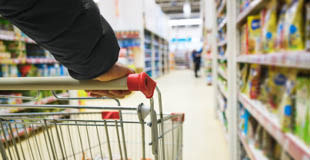Subsidiaries of Macy’s
- Bloomingdale’s
- Bluemercury
Key Findings
- Macy’s had made significant progress in 2019 by announcing the development of a safer chemicals policy and establishing a timeline for developing and implementing a restricted substance list (RSL) (for private-brand apparel, footwear, and home textiles by 2022 and non-apparel categories in 2024) and a manufacturing restricted substance list (MRSL) (for private-brand children’s apparel/footwear and home textiles by 2023 and non-apparel product categories in 2025). However, it is uncertain at this point if the RSL and MRSL will go beyond regulatory compliance. Macy’s also reported in 2019 that it partnered with OEKO-TEX to supply certain private-label products with that certification, although this standard does not go far enough in restricting all PFAS or toxic flame retardants.
- The company has not disclosed any progress in implementing or expanding its policy since the last report card.
Recommendations for Macy’s
- Macy’s can make progress by developing a strong public written safer chemicals policy, developing and enforcing a public beyond restricted substance list (BRSL) that clearly goes further than legal or regulatory requirements, and setting public quantifiable goals with clear timelines for reducing and eliminating chemicals of high concern (CHCs). The company should also adopt and implement strong accountability measures and disclosure requirements along with the safer chemicals policy.
- We urge the company to eliminate and safely replace any per- and polyfluoroalkyl substances (PFAS), toxic flame retardants, and phthalates that may be in the products it sells. The company should also eliminate plastics of environmental health concern (PEHCs) from its product and packaging materials (beyond food packaging for its in-store restaurants if that restriction is still in place). Macy’s should publicly disclose the alternatives used to replace CHCs after eliminating them.
- Macy’s should also become a signatory to the Chemical Footprint Project and pilot it with key private label suppliers. Finally, Macy’s should report on the status of its commitment to eliminate toxic flame retardants in furniture. Note: Our assessment is primarily based on the policies and practices of Macy’s, the parent company.
Grade History
How does Macy's compare to its competitors?
Analysis of Macy’s
Oversight: Established management responsibilities and incentives
Disclosure: Requires suppliers to report use of chemicals in products to retailer
Action: Reduced or eliminated chemicals of high concern (CHCs) or plastics of environmental health concern (PEHCs) within the last three years
Safer Alternatives: Evaluates safer alternatives, avoids regrettable substitutes
Transparency: Demonstrates a commitment to transparency and public disclosure
Third-party Standards: Promotes credible third-party standards for safer products
Extra Credit:
Joint Announcement: Public commitment demonstrated through joint announcement
Continuous Improvement: Shows continuous improvement by steadily expanding safer chemicals policy
Collaboration: Actively participates in collaborative process to promote safer chemicals
Impact Investment: Investing financial resources into independent research into safer alternatives and/or green chemistry solutions




